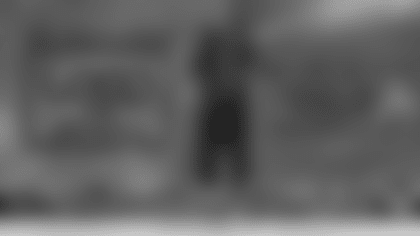Receivers Could Get More Protection from NFL Next
Season
INDIANAPOLIS – If the NFL's Competition Committee has its way, receivers will get more protection next season.
Players snapping for field goals will, too.
While post-season overtime likely will be among the highest-profile issues at the NFL's Annual Meeting in Orlando, Fla., next week, as pressing to members of the Competition Committee – of which Colts President Bill Polian is a longtime member – is the issue of player safety.
"One thing I want to emphasize is it's not that player safety is being brought up because of the numbers," Competition Committee co-chair and Atlanta Falcons President Rich McKay said Wednesday on a conference call.
"It's being brought up because we think it's imant and we think we should always look for ways to make the game safer when we can. We were looking at hits that occur in the open field and hits that occur to players that really do not have the opportunity to defend themselves."
The Competition Committee, after meeting at the NFL Scouting Combine in Indianapolis last month, met this past week in Naples, Fla., first analyzing the league statistically, then surveying teams and reviewing suggestions.
The committee met with NFL Players Association representatives in Indianapolis, as well as NCAA officials and representatives from college football.
One of the jobs of the committee is an overall review of the league.
"We feel really comfortable that the game is in a good place," McKay said.
The committee will recommend that the league modify post-season overtime from the current "sudden-death" format used in the regular- and post-season. The committee will recommend that if the team with possession first does not score a touchdown, then the other team will get possession with a chance to tie or win.
If the team with possession first scores a touchdown, that team would win the game. If the team with possession first scores a field goal, and the other the team scores a field goal, then the game would go into the traditional sudden-death format.
But McKay also said player safety is an ongoing focus, and after reviewing film from this past season – including every play on which an injury occurred – the committee focused on furthering ways to protect players. The major area of concern, McKay said, remains defenders launching into defenseless receivers.
"Unnecessary roughness was up in 2009 – but slightly, not dramatically," McKay said. "We watched so much video that I can't describe to you how much video we watched. We saw literally every injury this year. We saw all the tape on the defenseless player and the defenseless receiver. There are definitely some instances in which there are hits that we would like to see changed and the target area or the launch area, if you will, lowered.
"That's why we tried to expand or proposed that we expand the defenseless receiver protection even a little more."
The rules currently protect a defenseless receiver until he has completed the catch – meaning possession of the ball and two feet on the ground. McKay said language will be proposed to say, "If a receiver has completed the catch and has not had time to protect himself, a defensive player is prohibited from launching into him in a way that causes a defensive player's helmet, facemask, shoulder or forearm to forcibly strike the receiver's head."
"We're just trying to expand the protection period of time because we've seen tape where people literally have caught the ball and had no opportunity to avoid, to protect themselves, in any way," McKay said. "It's that moment in time where we just think the receiver has not yet become a runner."
McKay said there were "many instances in which the tackles are very good, separate the ball and do everything they're taught to do and don't violate the rules."
McKay said while the committee wants to protect receivers a bit more, rules changes in the last decade and a half to address the area have been effective.
"If you look back at the defenseless receiver and where we were in '94 and '95, and the hits some of those receivers took – I think the rule has come a long way in preventing a lot of those hits that we even saw in those days," McKay said. "There is more we would like to limit."
The committee also is recommending:
• That no defender be allowed to lineup within the frame of the body of the snapper to allow the snapper "to get his head up and get himself protected," McKay said.
• That the ball be declared dead if a runner loses his helmet during a play. Such a rule exists in college. "We watched tape and there are instances where players are running in the field of play without their helmets," McKay said. "In our mind, that's not necessarily a safe situation."
McKay said there are about seven other playing rules that will be proposed, most of which he said are "more cleanup" situations of existing rules.
One such rule involved the ball hitting the scoreboard at Cowboys Stadium in Dallas during plays. The league installed a rule on a temporary basis this past season, and McKay said the rule will be re-submitted. The rule creates a dead ball if a ball hits the scoreboard.
The committee also is proposing that "dead ball" fouls occurring on the final play of a half or regulation carry over to the second half or overtime.
Also, the committee is recommending a rule expanding the numbering system, allowing players to wear different numbers. McKay said this rule would acknowledge that many teams are playing a 3-4 defense.
"You have a lot of '50' players who end up being defensive ends and linebackers, so we're trying to address that," McKay said.
McKay also discussed:
• The NFL's competitive balance. "The competitive balance appears to be a very strong suit of ours," he said, citing five first-time Super Bowl winners in the last 10 years and five new division winners in 2009 compared to 2008.
• Yards per game, scoring and plays per game. All categories were either up or in the range the committee prefers. "Statistically, we think the game is in good stead," McKay said.
Also, the committee is filing a resolution that the policy regarding stadiums with large, opening windows – such Lucas Oil Stadium and Cowboys Stadium – be the same as that regarding stadiums with retractable roofs.
Teams with retractable roofs must declare if the roof will be open or closed 90 minutes before kickoff. Thereafter, the only change that can be made is closing the roof if weather dictates.
McKay said there had been temporary language in the rules at the beginning of this past season.
"Ninety minutes before the game, the home team can declare if those windows are going to be open or if if they're going to be closed," McKay said. "Whichever way they declare, they remain in that position unless if you declared them open and it began to rain.
"Then, you could close them, or if hazardous weather came up, obviously you could close them."














